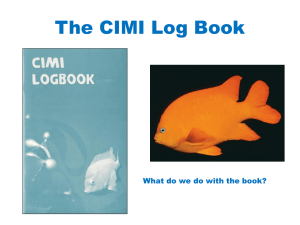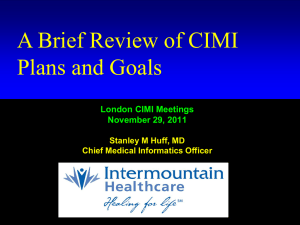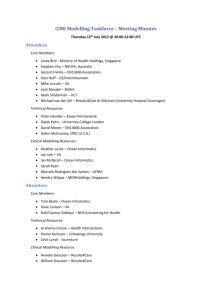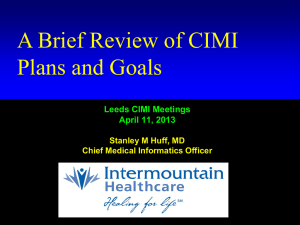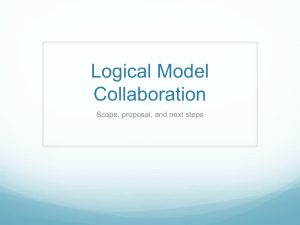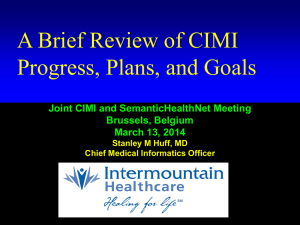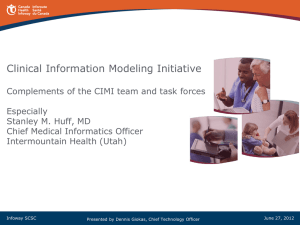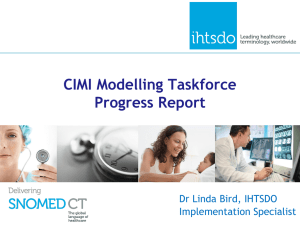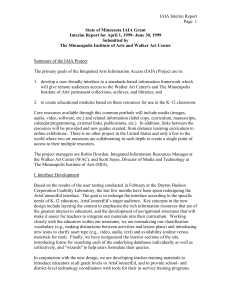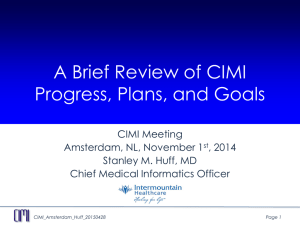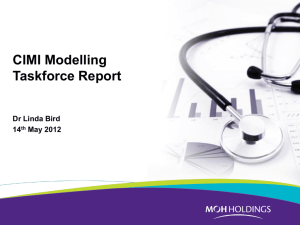Document
advertisement
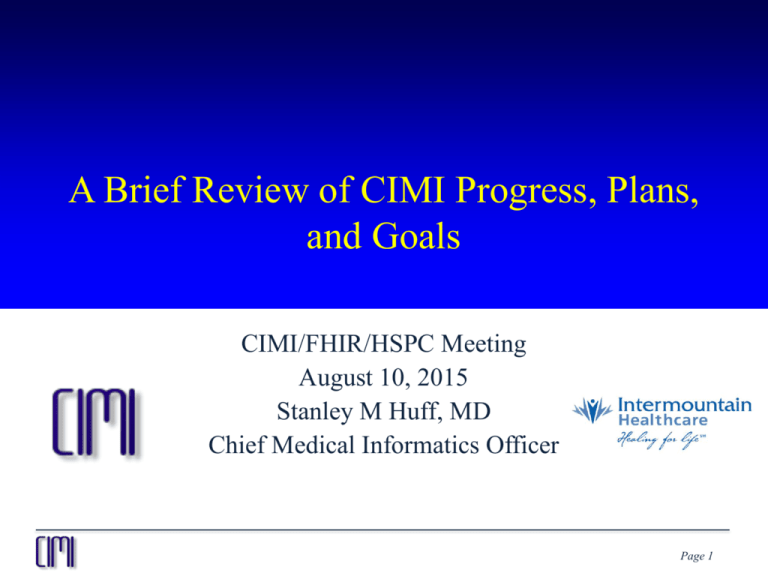
A Brief Review of CIMI Progress, Plans, and Goals CIMI/FHIR/HSPC Meeting August 10, 2015 Stanley M Huff, MD Chief Medical Informatics Officer Page 1 Introduction • Welcome to the Intermountain Healthcare Transformation Lab • Continental breakfast, afternoon snacks, lunch on your own • Purpose of these meetings: – Aug 10: Technical meeting: Laying out a course for CIMI to write HL7 FHIR profiles/clinical models – Aug 11: Clinical meeting: Creating broad consensus on HL7 FHIR profiles for true interoperability – Aug 12 -13 HSPC technical meetings • Powerpoint presentations for background, but the goal is to have discussions leading to decisions and actions – We can change the agenda as needed • All of the slides will be made available • Any suggested changes or additions to the agenda? Page 2 Laying out a course for CIMI to write HL7 FHIR profiles/clinical models Page 3 Context for this presentation • The Clinical Information Modeling Initiative (CIMI) is a community of interest that is producing detailed clinical information models to enable interoperability of health care information systems (see http://www.opencimi.org/ ) • CIMI models are licensed free for use for all purposes, including commercialization and creation of derivative works • CIMI is becoming a work group within HL7 Page 4 A diagram of a simple clinical model Detailed Information Model for Systolic Blood Pressure SystolicBP SystolicBPObs data 138 mmHg LOINC quals BodyLocation BodyLocation data Right Arm PatientPosition PatientPosition data Sitting SNOMED CT HL7 FHIR Resources and Profiles FHIR Resource Lab Obs Observation Patient Obs Family Hx Obs FHIR Profiles Qn Lab Obs Hematocrit Qual Lab Obs Titer Lab Obs Serum Glucose Urine Sodium Invariant Profile Structure – CIMI Leaf Node Content #6 Background and Details on CIMI CIMI_Phoenix_Huff_20140501 Page 7 CIMI Executive Committee • • • • • • • Stan Huff Virginia Riehl Nicholas Oughtibridge Jamie Ferguson Jane Millar Tom Jones Dennis Giokas Page 8 CIMI Modeling Taskforce • • • • • • • • • • • • Linda Bird Harold Solbrig Thomas Beale Gerard Freriks Daniel Karlsson Mark Shafarman Jay Lyle Michael van der Zel Stan Huff Sarah Ryan Stephen Chu Galen Mulroney • • • • • • • • • • • • Heather Leslie Rahil Siddiqui Ian McNicoll Michael Lincoln Anneke Goossen William Goossen Josh Mandel Grahame Grieve Dipak Kalra Cecil Lynch David Moner Peter Hendler Page 9 Intermountain’s Motivation for CIMI Page 10 The Ultimate Value Proposition of CIMI Interoperable sharing of: • Data • Information • Applications • Decision logic • Reports • Knowledge Page 11 Patient Page 12 Core Assumptions ‘The complexity of modern medicine exceeds the inherent limitations of the unaided human mind.’ ~ David M. Eddy, MD, Ph.D. ‘... man is not perfectible. There are limits to man’s capabilities as an information processor that assure the occurrence of random errors in his activities.’ ~ Clement J. McDonald, MD Page 13 Page 14 Newborns with hyperbilirubinemia 50 50 Bilirubin > 19.9 mg/dL Bilirubin > 25 mg/dL 40 40 34 34 32 31 30 30 28 26 30 28 27 26 26 24 27 27 25 24 22 20 21 20 19 17 16 20 16 14 14 15 15 16 15 13 13 13 12 10 10 1 1 1 2 0 1 2 0 10 3 1 0 0 0 1 0 1 1 0 M ar 2 N ov n 20 04 1 10 0 0 0 0 Ja 2 Ju l Se p 2 M ay 0 1 M ar 2 N Ja ov n 20 03 0 3 Ju l Se p 2 M ay 0 2 M ar 3 N Ja ov n 20 02 0 3 Ju l Se p 00 1 0 3 2 M ay 0 1 16 15 M ay 34 32 M ar 2 Number of patients 37 Page 15 Clinical System Approach Intermountain can only provide the highest quality, lowest cost health care with the use of advanced clinical decision support systems integrated into frontline clinical workflow Page 16 Decision Support Modules • • • • Antibiotic Assistant Ventilator weaning ARDS protocols Nosocomial infection monitoring • MRSA monitoring and control • Prevention of Deep Venous Thrombosis • Infectious disease reporting to public health • • • • • • • • • • Diabetic care Pre-op antibiotics ICU glucose protocols Ventilator disconnect Infusion pump errors Lab alerts Blood ordering Order sets Patient worksheets Post MI discharge meds Page 17 We can’t keep up! • We have ~150 decision support rules or modules • We have picked the low hanging fruit • There is a need to have 5,000 decision support rules or modules • There is no path from 150 to get to 5,000 unless we fundamentally change the ecosystem Page 18 Strategic Goal • Be able to share data, applications, reports, alerts, protocols, and decision support modules with anyone in the WORLD • Goal is “plug-n-play” interoperability Page 19 FHIR Profiles from CIMI Models (using standard terminology) Heterogeneous Systems Commercial EHR Home Grown System System Integrator Others… Page 20 2015 HIMSS Demonstrations Page 21 CIMI Vision, Mission, and Goals Page 22 What Is Needed to Create a New Paradigm? • Standard set of detailed clinical data models coupled with… • Standard coded terminology • Standard API’s (Application Programmer Interfaces) for healthcare related services • Open sharing of models, coded terms, and API’s • Sharing of decision logic and applications Page 23 Clinical modeling activities • • • • • • • • • • • • • • Netherlands/ISO Standard ISO EN 13606 UK – NHS and LRA Singapore Sweden Australia openEHR Foundation Canada US Veterans Administration US Department of Defense Intermountain Healthcare Mayo Clinic MLHIM Others…. • SemanticHealthNet • HL7 – Version 3 RIM, message templates – TermInfo – CDA plus Templates – Detailed Clinical Models – greenCDA • Tolven • NIH/NCI – Common Data Elements, CaBIG • CDISC SHARE • Korea - CCM • Brazil Page 24 Clinical Information Modeling Initiative Mission Improve the interoperability of healthcare systems through shared implementable clinical information models. (A single curated collection.) Page 25 Clinical Information Modeling Initiative Goals • Create a shared repository of detailed clinical information models • Using an approved formalism – Archetype Definition Language (ADL) – Archetype Modeling Language (AML) • Based on a common set of base data types • With formal bindings of the models to standard coded terminologies • Repository is open to everyone and models are licensed free for use at no cost Page 26 Page 27 Access to the models • Browse and download models • CIMI models – http://www.clinicalelement.com/cimi-browser/#/ • Intermountain models – http://www.opencem.org/#/ Page 28 Goal: Models supporting multiple contexts • • • • • • • • EHR data storage and retrieval using standard APIs Message payload and service payload Decision logic (queries of EHR data) Clinical trials data (clinical research) Quality measures Normalization of data for secondary use Creation of data entry screens (like SDC) Capture of coding output from NLP Page 29 Selected CIMI Policies, Decisions, and Milestones Page 30 Terminology • SNOMED CT is the primary reference terminology • LOINC is also approved as a reference terminology – In the event of overlap, SNOMED CT will be the preferred source – (Propose that LOINC be used for lab observations - Stan) • CIMI will propose extensions to the reference terminologies when needed concepts do not exist – CIMI will have a place to keep needed concepts that are not a part of any standard terminology • CIMI has obtained a SNOMED extension identifier • CIMI will adhere to IHTSDO Affiliate’s Agreement for referencing SNOMED codes in models – Copyright notice in models, SNOMED license for all production implementations • CIMI will create a Terminology Authority to review and submit concepts to IHTSDO as appropriate Page 31 IsoSemantic Models – Example of Problem (from Dr. Linda Bird) e.g. “Suspected Lung Cancer” Page 32 Data Comes in Different Shapes and Colors Finding – Suspected Lung Cancer Finding – Suspected Cancer Location – Lung Finding – Cancer Location – Lung Certainty – Suspected (Let’s say this is the preferred shape) Page 33 Data Standardized in the Service Application Application and User Data in preferred shape and color Shape and color translation Shape and color of data in the local database Page 34 Partial Interoperability Application Application and User Standard Terms (Non-standard Structure) Term Translators Local databases, CDA, HL7 V.2, etc. Page 35 Preferred Strategy – Full Interoperability Application Application and User Standard Structure AND Standard Terms Requirements (As defined by CIMI Models) Term and Structure Translators Local databases, CDA, HL7 V.2, etc. Page 36 Reasons to do it on the server side • Person writing the translation is most likely to understand the meaning of the data in their own database. • The person writing the translation only has to understand their own data and the preferred model. – They can optimize query execution for their own system • The query for the data is simpler. If the application has to write a query that will work for all shapes, the query will be inefficient to process by every system. Page 37 Some Principles • CIMI DOES care about implementation. There must be at least one way to implement the models in a popular technology stack that is in use today. The models should be as easy to implement as possible. • Only use will determine if we are producing anything of value – Approve “Good Enough” RM and DTs – Get practical use ASAP – Change RM and DTs based on use Page 38 Primary Near Term Goals • As soon as possible, make some high quality CIMI models available in a web accessible repository – ADL 1.5 (AOM framework) and/or UML (AML, XMI) – That use the CIMI reference model – That have complete terminology bindings • Get the models used in someone’s working system • Document our experience • Improve our processes and models • Repeat! Page 39
